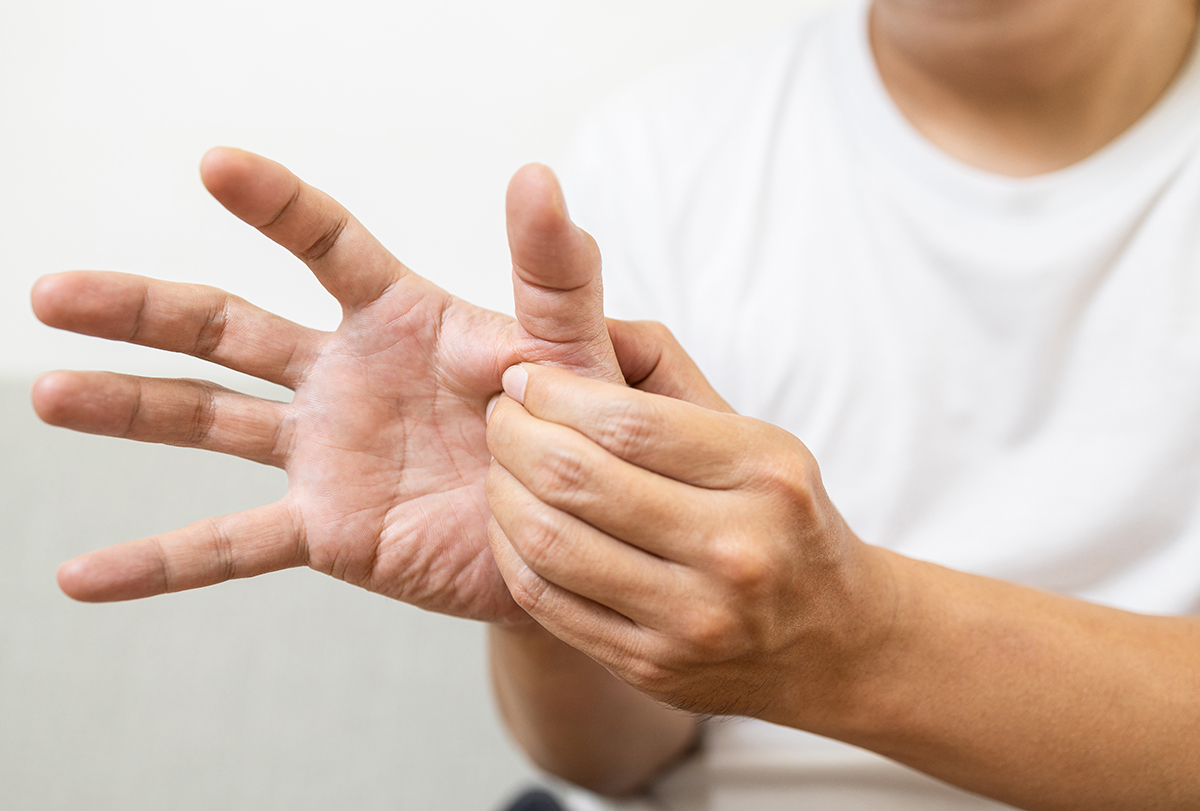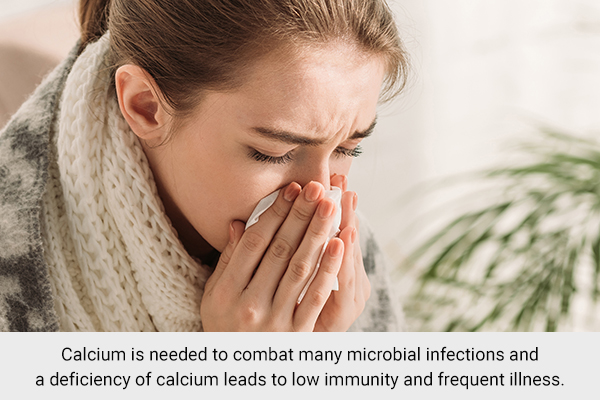In this article:
Calcium is an important mineral in the body. About 99% of the calcium in the body is stored in the bones, and the remaining is distributed in muscle, blood, and other tissues. (1) The mineral not only provides strength and support to the bones but also serves as a depot to maintain serum calcium levels.

Calcium plays an important role in many functions of the body such as muscle contraction, the transmission of nerve impulses, blood clotting, and the efficient functioning of the heart. (2)
Calcium deficiency is a global problem, and published estimates suggest that approximately half of the global population suffers from some form of calcium deficiency. (3)
Many factors contribute to calcium deficiency, the most common being inadequate dietary intake. Other contributing factors include aging, low vitamin D levels, and hormonal imbalances.
Most people either are unaware of the symptoms of calcium deficiency or ignore it until it becomes a serious problem. It is important to be aware of the symptoms of calcium deficiency and address them so that major health issues are averted and you can lead a good quality of life.
A simple blood test will tell you whether you are suffering from calcium deficiency.
Warning Signs of Calcium Deficiency
Here are some of the warning signs of calcium deficiency.
1. Weak bones
Calcium is the main element in the building of bones. Hence, a deficiency of calcium leads to the weakening of bones.
When there is a calcium deficiency, not only is bone formation affected but also calcium is leached out of the bones, and this leads to further weakening of the bones. There is a risk of osteoporosis, and in extreme cases, there is a loss of stature and a stooped frame.
In a 2014 report of a study conducted on Korean men and women, a low dietary calcium intake was related to a low bone mineral density and increased risk of osteoporosis. (4)
Hence, ensure that your children take adequate calcium in their diet, and if necessary, give them calcium supplements after consultation with your doctor.
Dairy products such as milk, cheese, yogurt, and kefir are rich natural sources of calcium. Plant foods that are sources of calcium include spinach and kale, but in these, the bioavailability of calcium is restricted on account of oxalates and phytates, which chelate the calcium. (5)
2. Weak teeth
Calcium is essential for the formation of teeth. Hence, a deficiency of calcium can affect oral health, leading to defective tooth formation in children. In adults, it may lead to weak teeth prone to dental caries.
A report published in 2015 correlated a high risk of developing dental caries and oral disease with a low calcium intake in a group of young women. (6)
3. Muscle aches and cramps

Calcium is necessary for muscle contraction and transmission of nerve impulses. Hence, a deficiency of calcium causes muscle cramps and a tingling sensation in the legs.
Extreme cases of calcium deficiency may lead to tetany characterized by hyperexcitability of the nerves and muscles. (7)
There is facial twitching in more severe cases of calcium deficiency. This is called the Chvostek sign and manifests as twitching when the facial nerve is tapped. (8)
4. Blood pressure
Blood pressure is regulated by intracellular calcium in vascular smooth muscle.
A review on calcium intake and health published in 2019 documented that, in humans and animals with a low calcium intake, the blood pressure improved upon calcium supplementation to reach the recommended daily dose. No effects were observed in humans and animals taking sufficient calcium.
This suggests that a normal intake of calcium is necessary to maintain normal blood pressure. (9)
5. Rickets
Nutritional rickets is usually attributed to a deficiency of vitamin D. However, a 2012 study conducted on Indian children has proved that rickets develops when there is low calcium intake along with borderline levels of vitamin D. (10)
6. Dysmenorrhea or menstrual cramps
Dysmenorrhea is the medical term for menstrual cramps. Low levels of calcium cause an increase in the contraction of the uterine muscles, leading to pain and decreased uterine blood flow. (11)
A deficiency of calcium is associated with more cramping, changes in menstrual flow, and premenstrual syndrome (PMS). Adding more calcium to a diet may ease these symptoms. (2)
7. Increased susceptibility to infection

Calcium is needed to combat many microbial infections, and a deficiency of calcium leads to low immunity and frequent illness.
In a 2017 study on human cells and mice, it has been reported that a calcium signal is necessary to cause the utilization of nutrients by immune cells and enable their multiplication to create an army of defender cells to neutralize the invading pathogen. (12)
8. Slow wound healing
When tissue injury occurs, there is a coagulation of blood, resulting in the formation of a fibrin network. Calcium is necessary for this process.
Apart from this, calcium also directs different cell types to the site of injury and directs the repair process so that the injured tissue is repaired. (13)
Thus, calcium plays a role in wound healing and a deficiency of calcium could hamper the process of wound healing.
9. Sleep disorders
A deficiency of calcium has been associated with difficulty in falling asleep and nonrestorative sleep, as reported in 2014 in the Journal of Sleep. (14)
Sleep is induced by the production of the sleep hormone melatonin. This hormone regulates the sleep-wake cycle. You have a sound sleep when your body produces melatonin. A deficiency of melatonin results in insomnia and other sleep disorders.
Calcium is necessary for the activity of the enzyme required to produce the sleep hormone melatonin. (15) A deficiency of calcium hampers melatonin production, resulting in sleep disorders.
Additional Tips to Overcome Calcium Deficiency

- Include calcium-rich foods such as milk, yogurt and other dairy products, cereals, green leafy vegetables, and fortified fruit juices in your diet.
- Vitamin D is essential for the regulation of calcium levels in the blood; hence, ensure that you take in adequate vitamin D. (16) A sure way of getting enough vitamin D is to bask in the early-morning sunlight for at least 20 minutes daily.
- Magnesium helps in the retention of calcium. (17) Hence, include magnesium-rich foods such as spinach, pumpkin seeds, sesame seeds, and whole grains in your diet.
- Restrict your intake of sodium, soda, and caffeine since these are known to interfere with calcium absorption.
What Is the Calcium Intake and Status Among People?
- Everyone is born with only about 26–30 g of calcium in their body, but this amount starts increasing rapidly after birth and reaches approximately 1,200 g in females and 1,400 g in males by adulthood. Men tend to sustain these calcium levels, but women experience a gradual decrease in their body’s calcium reserves after the onset of menopause. Menopause is characterized by a significant decline in the production of estrogen in the female body. Estrogen is a hormone needed for proper calcium absorption. Lack of estrogen, therefore, hampers the body’s ability to absorb and store calcium.
- Total calcium levels can be measured in serum or plasma; serum levels are typically 8.8–10.4 mg/dL (2.2–2.6 mmol/L) in healthy people. (18)
- National Health and Nutrition Examination Survey (NHANES) data from 2007 to 2010 showed that 49% of kids in the age bracket of 4–18 years and 39% of all people aged 4 years or above do not meet the estimated average requirement (EAR) for calcium through foods and supplements. (18)
- Men aged 20 years or above have a daily intake of about 1,083 mg of calcium from foods and beverages on average. Meanwhile, the average daily intake of calcium from foods and beverages for women in the same age group is estimated to be 842 mg. Children between the ages of 2 and 19 years tend to consume 965–1,015 mg of calcium per day from foods and beverages on average.
- Nearly 22% of all adult males, 32% of all adult females, and 4%–8% of kids consume a calcium-containing supplement. (18)
- The average daily consumption of calcium from dietary sources as well as supplements is estimated to be 1,156 mg for males, 1,009 mg for females, and 968–1,020 mg for kids.
- Poverty is also linked with a higher risk of calcium deficiency. According to the NHANES data from 2007 to 2014, adults aged 50 years or older with a yearly household income of less than $20,000 are 11.6% more likely to have inadequate calcium intake (less than 800 to 1,100 mg) than those with higher earnings. (18)
Most-Asked Questions About Calcium Deficiency
Who is at the greatest risk of calcium deficiency?
People with lactose intolerance and people who do not eat dairy products such as vegans are at the most risk of calcium deficiency along with postmenopausal women, pregnant and lactating mothers, children, and the elderly.
What diseases cause calcium deficiency?
Some of the diseases causing calcium deficiency are hypoparathyroidism, low levels of vitamin D, kidney diseases, and low levels of magnesium.
Do calcium supplements interact with thyroid medications?
Calcium carbonate supplements can interfere with the absorption of levothyroxine, a thyroid hormone that comes in the form of medication (Synthroid, Levoxyl, and others) and is used to treat hypothyroidism and thyroid cancer.
According to the FDA, you should not take levothyroxine within 4 hours of taking calcium carbonate supplements.
Final Word
Calcium is an important mineral that plays a vital role in many physiological functions in the body, in addition to its function in maintaining healthy bones and teeth. Hence, a deficiency of calcium affects many body functions as well as causes osteoporosis.
Prevention of calcium deficiency is crucial to maintaining good health. Try to increase your intake of calcium by consuming natural calcium-rich foods. If you feel the need for a supplement, consult your doctor.
- Was this article helpful?
- YES, THANKS!NOT REALLY


